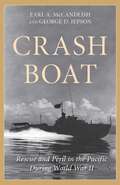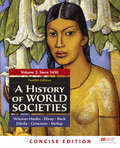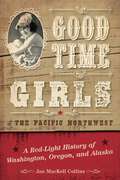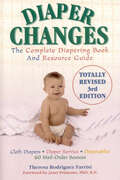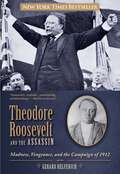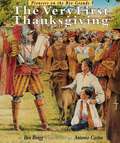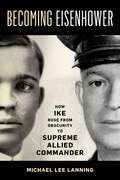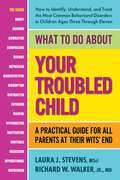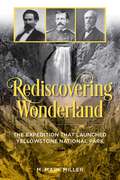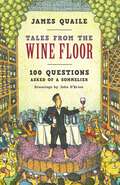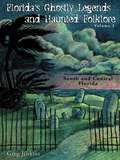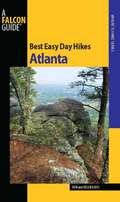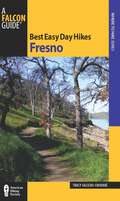- Table View
- List View
The History and Mystery of the Menger Hotel
by Docia Schultz WilliamsThis is the definitive account of a beloved hotel that has played a memorable role in San Antonio's history. Generously illustrated, this is the fascinating story of the people who owned the Menger and the noteworthy folk they entertained.
Crash Boat: Rescue and Peril in the Pacific During World War II
by George D. JepsonAfter the Japanese attacked Pearl Harbor on December 7, 1941, young Americans lined up at recruiting stations across the nation. Crash Boat is the compelling story of an armed United States air-sea rescue boat crewed by volunteers during World War II in the South Pacific. Only months earlier, they had been civilians, living the best years of their lives. In the Pacific, they conducted dramatic rescues of downed pilots and clandestine missions off of enemy-held islands at great peril and with little fanfare. George D. Jepson chronicles these ordinary young men doing extraordinary things, as told to him by Earl A. McCandlish, commander of the 63-foot crash boat P-399. Nicknamed Sea Horse, the vessel and her crew completed over thirty rescues at sea, weathered typhoons, fought a fierce gun battle with Japanese forces, experienced life from another age in isolated native villages, carried out boondoggle missions, and played a supporting role in America&’s return to the Philippines.
A History of World Societies, Concise Edition, Volume 2: Since 1450
by Jerry Davila John McKay Roger Beck Clare Crowston Merry E. Wiesner-Hanks Patricia Buckley EbreyA History of World Societies provides a concise overview of world history by sharing the cultural stories of global people -- all through a regional lens.
Good Time Girls of the Pacific Northwest: A Red-Light History of Washington, Oregon, and Alaska
by Jan MacKell CollinsThroughout the development of the American West, prostitution grew and flourished within the mining camps, small towns, and cities of the nineteenth-century Pacific Northwest. Whether escaping a bad home life, lured by false advertising, or seeking to subsidize their income, thousands of women chose or were forced to enter an industry where they faced segregation and persecution, fines and jailing, and battled the hazards of disease, drug addiction, physical abuse, and pregnancy. They dreamed of escape through marriage or retirement, but more often found relief only in death. An integral part of western history, the stories of these women continue to fascinate readers and captivate the minds of historians today.
Diaper Changes: The Complete Diapering Book and Resource Guide
by Theresa Rodriguez FarrisiEvery new parent should know the facts about modern, convenient cloth diapers. With a small up-front investment and a few extra hours a week, families can save hundreds of dollars.
Theodore Roosevelt and the Assassin: Madness, Vengeance, and the Campaign of 1912
by Gerard HelferichA New York Times Bestseller!John Flammang Schrank—a lonely Manhattan saloonkeeper—was obsessed with the 1912 presidential election and Theodore Roosevelt. The ex-president’s extremism and third-term campaign were downright un-American. Convinced that TR would ignite civil war and leave the nation open to foreign invasion, Schrank answered what he believed to be a divine summons,buying a gun and stalking Roosevelt across seven Southern and Midwestern states, blending into throngs of supporters. In Chattanooga and Chicago, he failed to act. In Milwaukee, on October 14, Schrank crossed TR’s path again—BANG!Theodore Roosevelt and the Assassin is the dynamic unfolding account of the audacious attempt on Roosevelt’s life by a lone and fanatical assailant. Based on original sources including police interrogations, eyewitness testimony, and newspaper reports, the book is above all a fast-paced, suspenseful narrative. Drawing from Schrank’s own statements and writings, it also provides a chilling glimpse into the mind of a political assassin. Rich with local color and period detail, it transports the reader to the American heartland during a pivotal moment in our history, when the forces of progressivism and conservatism were battling for the nation’s soul—and the most revered man in America traveled across the country campaigning relentlessly against Howard Taft, Woodrow Wilson, and Socialist Eugene V. Debs in what historians agree was the first modern American presidential contest.
Fun with the Family Pennsylvania: Hundreds of Ideas for Day Trips with the Kids (Fun with the Family Series)
by Christine O'TooleGeared towards parents with children between the ages of two and twelve, Fun with the Family Pennsylvania features interesting facts and sidebars as well as practical tips about traveling with your little ones.
Yellowstone National Park: Eye of the Grizzly (Adventures with the Parkers)
by Mike GrafDear Diary,Guess what? We&’re sitting with hundreds of people waiting for the world&’s most famous geyser, Old Faithful, to erupt. I can&’t wait to see it . . .Join the Parkers, an intrepid family of four, as they explore the wonders of America&’s first national park, Yellowstone. Twins Morgan and James marvel over the geysers, thermal pools, and vast array of wildlife. But when they come face to face with a grizzly, what will they do?Each book in the exciting Adventures with the Parkers series for kids 8–13 explores a popular national park and is packed with adventure as well as engaging and educational facts about nature, outdoor safety, and much more. Vacation has never been this fun! Books in the Adventures with the Parkers Series:Bryce Canyon and Zion National Parks: Danger in the NarrowsGlacier National Park: Going to the SunGrand Canyon National Park: Tail of the ScorpionGreat Smoky Mountains National Park: Ridge Runner RescueMount Rushmore, Badlands, Wind Cave: Going UndergroundOlympic National Park: Touch of the Tide Pool, Crack of the GlacierRocky Mountain National Park: Peril on Longs PeakYellowstone National Park: Eye of the GrizzlyYosemite National Park: Harrowing Ascent of Half Dome
The Very First Thanksgiving: Pioneers on the Rio Grande
by Bea BraggTwenty-three years before the Mayflower arrived in New England, a thanksgiving feast was held near present-day El Paso by the members of the Onate expedition.Ages 7-12
Becoming Eisenhower: How Ike Rose from Obscurity to Supreme Allied Commander
by Michael Lee LanningWhen Dwight Eisenhower graduated from West Point in 1915, few would have predicted he was destined for greatness. A middling student, he was denied his first choice of posting, missed overseas service in World War I, spent a dozen years as a major, and never commanded a unit larger than a battalion. Yet the young officer made the most of the opportunities he was given, made a lasting impression on superiors including George Marshall, and eventually gained a reputation as an excellent staff officer with a knack for administration, loyalty, and &“getting along.&” Eisenhower was promoted to colonel in March 1941 and, sixteen months later, was a lieutenant general in command of the European Theater of Operations. His rise through the ranks was first painfully slow, then meteoric. It is one of the great, and most important, stories in military history, and Michael Lee Lanning tells it vividly, with an eye for the dramatic turning points in Eisenhower&’s rise.The West Point class of 1915 was &“the class the stars fell on.&” Fifty-nine graduates became generals during World War II, but none of that was clear at the time, especially not for the young Dwight Eisenhower, who graduated 61st in a class of 164. He failed to make the baseball team, but made the football team, only to see an injury end his playing career, and was known as a card player and prankster. Denied his request for service in the Philippines, Eisenhower was sent to Texas, where he spent a good bit of his time coaching football. Later denied his request to fight in France, he spent World War I training a tank unit near Gettysburg. During the 1920s into the early 1930s—lean years for the army during which promotions came slowly and many officers quit the service—Eisenhower started to catch the eye of superiors and earned positions under the U.S. Army&’s leading lights, including Fox Conner, John Pershing, and Douglas MacArthur, whom he served under during pivotal years in the 1930s, from the Bonus March to the Philippines.By the late 1930s, as war broke out in Europe, Eisenhower&’s star was on the rise. After serving in a series of staff positions—regimental executive officer, then corps and army chief of staff—Eisenhower joined the General Staff in Washington, DC, where he helped develop war plans and eventually became deputy chief of staff under George Marshall. When the time came to appoint a commander to execute the plans, Eisenhower recommended another officer, but Marshall knew Eisenhower was the man for the job.Becoming Eisenhower is the story of a young man who first pursued the army for its free education but ultimately found his calling as an officer, the story of an officer who was initially overlooked but was motivated by this frustration to make himself the army&’s indispensable man, the story of how General Eisenhower carried these experiences not only into Supreme Command but also the presidency. This book will be essential reading for World War II buffs, people interested in American presidents, and readers looking for the leadership lessons of history.
What to Do About Your Troubled Child
by Laura Stevens, MSci Richard W. Walker, Jr.As children grow, there may be times when their behavior seems out of place or troubling. When there is a recurrent pattern of one or more of these types of behavior, something may be wrong. As a parent, if you have noticed something &“off&” about the way your child has been acting, perhaps it&’s time to take a closer look at what might actually be going on—before it gets worse. What to Do About Your Troubled Child is designed to provide you with the information you need to get to the bottom of the mystery. If a behavioral disorder is caught early enough and treated correctly, it can be greatly lessened or even eliminated. Unfortunately, many behavioral problems in children go undiagnosed for so long that they progress beyond the possibility of improvement.This book is divided into two parts. Part One looks at six of the most common behavioral disorders: Obsessive-Compulsive Disorder (OCD), Attention-Deficit/Hyperactivity Disorder (ADHD), Autism, Anxiety Disorders, Oppositional Defiant Disorder, and Conduct Disorder. Each chapter focuses on one disorder and includes a list of questions intended to determine if your child exhibits enough of the tendencies associated with this disorder to warrant a closer look. It then describes the symptoms and risk factors of the problem, how it may be professionally diagnosed, and traditional means of treatment, which include therapy and medication. Part Two offers a detailed look at complementary approaches to treatment, such as lifestyle changes, nutrition, beneficial programs, and helpful devices.Telling yourself that your child is bound to grow out of a certain pattern of behavior may be causing you to ignore the signs of a serious issue—one that should be addressed. By the time your child reaches adolescence, the disorder may be too far gone. Now is the time for you to understand and do something about it. Now is the time to let What to Do About Your Troubled Childbe your guide.
Rediscovering Wonderland: The Expedition That Launched Yellowstone National Park
by M. Mark MillerIn the nineteenth century people could gain fame and fortune by &“discovering&” and documenting things that were already known to exist like the source of the Nile and the North Pole. For decades trappers and prospectors had told about the wonders of the area that became Yellowstone Park, but no credible person had written about the falls, canyons, and geysers there. An ambitious politician, Nathaniel P. Langford, decided to make his name by promoting an expedition and publicizing its activities in 1870. An army lieutenant named Gustavus Doane maneuvered to lead the expedition&’s army escort for the same reason. Their written accounts of the big &“discovery&” of Wonderland were the basis for the park&’s founding in 1872. Rediscovering Wonderland brings together the words of these men, along with images of the expedition, to provide historical context for the exploration and founding of America&’s first national park.
Outlaw Tales of Utah: True Stories Of The Beehive State's Most Infamous Crooks, Culprits, And Cutthroats (Outlaw Tales Series)
by Michael RutterMassacres, mayhem, and mischief fill the pages of Outlaw Tales of Utah, 2nd Edition. Ride with horse thieves and cattle rustlers, stagecoach, and train robbers. Duck the bullets of murderers, plot strategies with con artists, hiss at lawmen turned outlaws. A refreshing new perspective on some of the most infamous reprobates of the Midwest.
A Hunter's Book of Days
by Charles FergusWhen award-winning outdoor and nature writer Charles Fergus decided to leave his longtime home in Pennsylvania, he wrote a memoir of his last season hunting upland birds—grouse, woodcock, and pheasant— in his favorite coverts, some of which he had visited every autumn for almost thirty years. His stories of memorable hunts and dogs, the loss of his beloved home ground, and enduring hunting friendships are gathered in A Hunter&’s Book of Days, a new book from Countrysport Press.
Our Favorite Flavors of the Season
by Gooseberry PatchAs the seasons change, so do our taste buds. Each season has us craving different kinds of foods that just seem to go with that particular time of year. Our Favorite Flavors of the Seasons has flavorful recipes for every season.Autumn has so many flavors and lots of special activities. Start off your game day with Cheddar-Sausage Cornbread Balls and October Bisque. Caramel Apple Cupcakes are a great addition to any get-together. For your Thanksgiving day dinner, Herbed Turkey Breast, Cranberry Pretzel Salad and Butterball Biscuits will help fill your table with wonderful flavors.On the cold days of Winter, keep warm with Snowy-Day Stew, Elegant Beef & Noodles or Scalloped Potatoes & Ham. Round off any meal with a Winter Garden Salad or Sweet Potato Crisp. Grandma&’s Gingerbread Cake will bring back memories of Christmases gone by.Spring and Summer bring out foods with lots of fresh ingredients. Tomato-Bacon Cups and Cool Vegetable Pizza are great starters. Chicken & Peaches or Ripe Tomato Tart will be perfect for an evening supper. For dessert, Blackberry-Peach Crumble and Really Fabulous Brownies are sure to please.Along with helpful seasonal tips and thoughtful quotes, Our Favorite Flavors of the Seasons is sure to fill your table year &’round with delicious meals for any occasion.
Only the Valiant: True Stories of Decorated Heroes
by Lamar UnderwoodIn Only the Valiant: True Stories of Decorated Heroes, editor Lamar Underwood has pulled together some of the finest writings about the nation&’s decorated heroes that capture readers imaginations, meticulously culled from books, magazines, movies, and elsewhere. It includes tales of legendary heroes from the Civil War through Afghanistan. ,
Food Lovers' Guide to® Pittsburgh: The Best Restaurants, Markets & Local Culinary Offerings (Food Lovers' Series)
by Laura Zorch Sarah Sudar Julia Gongaware Amanda McfaddenFood Lover's Guide to Pittsburgh is the ultimate guide to the city's food scene and provides the inside scoop on the best places to find, enjoy, and celebrate local culinary offerings. Engagingly written by local foodies, this guide is a one-stop resource for residents and visitors alike to find producers and pureyors of tasty local specialities, as well as a rich array of other, indispensible food-related information including:One-of-a-kind restaurants and landmark eateriesSpeciality food shopsThe city's best bakeriesLocal drink sceneFood festivals and culinary eventsRecipes from top Pittsburgh chefs
Insiders' Guide® to Philadelphia & Pennsylvania Dutch Country (Insiders' Guide Series)
by Marilyn Odesser-TorpeyInsiders' Guide to Philadelphia & Pennsylvania Dutch Country is the essential source for in-depth travel and relocation information to Pennsylvania's "City of Brotherly Love." Written by a local (and true insider), this guide offers a personal and practical perspective of the area.
Tales from the Wine Floor: 100 Questions Asked of a Sommelier
by James QuaileUnlike most books on wine nowadays, Tales from the Wine Floor is geared toward true beginners—those who enjoy wine but lack the most basic understanding of it. This book offers an easy-to-digest crash course on wine and ready-reference written by a Sommelier. The author explains the intricacies of wine to the average Joe (or Joanne) in a way that is easy to understand and highly entertaining. Here is an easy reference Q&A based on real questions (often absurd or hysterically funny) asked by regular, wine-drinking people and the answers the author gives them in his job as &“The Wine Guy.&” Among the questions and answers that comprise this book are: What Are Sulfites? Why Does the Same Wine Sometimes Taste Different? How Do I order Wine at a Restaurant? How Do I Host a Wine Tasting at Home? And, Why is Champagne Served on a Funny-Shaped Glass? Illustrated with amusing drawings by New Yorker cartoonist John O&’Brien, novice wine enthusiasts will find Tales from the Wine Floor informative, easily accessible, and a delight to read.
Florida's Ghostly Legends and Haunted Folklore: South and Central Florida (Florida's Ghostly Legends)
by Greg JenkinsHaunting ancient cemeteries and primitive landmarks as well as modern apartment complexes and highway sides, ghosts and restless spirits abound. This volume of Florida's Ghostly Legends and Haunted Folklore offers a delightful—and somewhat spooky—look into the darker side of the south and central areas of the Sunshine State. Explore fortress ruins in New Smyrna Beach, and keep an eye out for mysterious shadows and dark figures in the nearby forest; visit the island of Islamorada, where the ghostly remains of Flagler's railway rumble over tracks destroyed in the 1935 Labor Day Hurricane; and, if you're especially brave, walk through the eerie corridors of the mausoleum in Myrtle Hill Cemetery near Tampa, where you are sure to hear whispers from the dead or the muffled echoes of a music box. Delve into the unknown with Greg Jenkins as he examines the history, legend, and paranormal rationale behind strange occurrences in many of south and central Florida's haunted locations. Get a fresh look at some of the state's most famous ghost stories and learn never-before-heard tales of the strange and the supernatural as you take a trip through Haunted Florida. The second volume of Florida's Ghostly Legends and Haunted Folklore, covering north Florida and St. Augustine, is also available.Next in series > >See all of the books in this series
Best Easy Day Hikes Atlanta (Best Easy Day Hikes Series)
by Render DavisBest Easy Day Hikes Atlanta includes concise descriptions of the best short hikes in the area, with detailed maps of the routes. The 20 hikes in this guide are generally short, easy to follow, and guaranteed to please.
Slaughterhouse: The Shocking Story of Greed, Neglect, And Inhumane Treatment Inside the U.S. Meat Industry
by Gail A. EisnitzSlaughterhouse is the first book of its kind to explore the impact that unprecedented changes in the meatpacking industry over the last twenty-five years — particularly industry consolidation, increased line speeds, and deregulation — have had on workers, animals, and consumers. It is also the first time ever that workers have spoken publicly about what’s really taking place behind the closed doors of America’s slaughterhouses. In this new paperback edition, author Gail A. Eisnitz brings the story up to date since the book’s original publication. She describes the ongoing efforts by the Humane Farming Association to improve conditions in the meatpacking industry, media exposés that have prompted reforms resulting in multimillion dollar appropriations by Congress to try to enforce federal inspection laws, and a favorable decision by the Supreme Court to block construction of what was slated to be one of the largest hog factory farms in the country. Nonetheless, Eisnitz makes it clear that abuses continue and much work still needs to be done.
Outward Bound Map & Compass Handbook Revised (Outward Bound)
by Glenn RandallLong recognized as one of the seminal volumes on the fundamentals of map, compass, and altimeter route finding, Outward Bound Map & Compass Handbook now includes the latest information on GPS receivers, complete with all new color illustrations. This concise guide features practical adviceon choosing the right compass, reading and using topographical maps, using an altimeter to pinpoint your position, and mastering GPS. It also helps you steer clear of the most common route-finding errors and passes on an array of tips drawn from author Glenn Randall&’s rich store of experience in the wild. Whether you are looking for a beginner course on outdoor navigation or want to sharpen your skills before heading back into the wilderness, the third edition of Outward Bound Map & Compass Handbook will prove invaluable.
Our Favorite Halloween Recipes, 2nd Edition
by Gooseberry PatchJack-&’O-Lanterns, hayrides and a big harvest moon...it must be Halloween! In Our Favorite Halloween Recipes, 2nd Edition, you&’ll find lots of new recipes for delicious delights just perfect for Halloween fun! Serve your little goblins Mummy Hot Dogs and Devilishly Delightful Spaghetti before parading their ghostly costumes around the neighborhood. Honey-Glazed Bat Wings, Great Pumpkin Cheese Ball and Dracula's Salsa are perfect for little nibbles throughout the day. Marshmallow Cookie Spiders, Fudge Fingers and Haunted Forest Cherry Bars are terrific treats that will make any Halloween party a frightful success! You'll find plenty of spooky serving and decorating tips too! 64 Recipes.
Best Easy Day Hikes Fresno (Best Easy Day Hikes Series)
by Tracy SalcedoBest Easy Day Hikes Fresno includes descriptions and detailed maps for seventeen easy-to-follow trails, from urban paths to scenic routes in the foothills of the Sierra Nevada, many along the San Joaquin River. Enjoy the Pine Flat Lake as you follow the Edison Point Loop; stand above the tumbling San Joaquin on the Bridge Trail; or get a good workout on the Lewis S. Eaton Trail. Look inside for:• Casual hikes to half-day adventures• Hikes for everyone, including families• Mile-by-mile directions and clear trail maps• Trail Finder for best hikes for children,water lovers, or dogs• GPS coordinates

